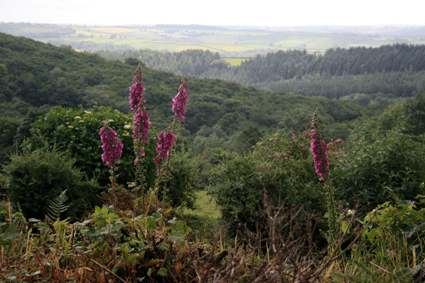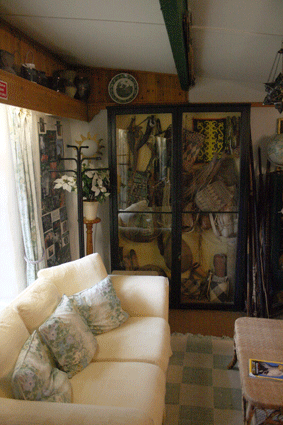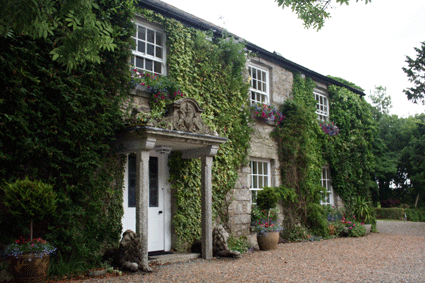It’s not every day that you get to stay at the home of an explorer. So I wonder what’s in store as I approach Bodmin Moor in Cornwall, on the edge of which lives one of the UK’s greatest explorers, Robin Hanbury-Tenison.
Cabilla Manor, a delightful Georgian farmhouse high up on the moor, is home to Robin and his wife Louella, who, along with accompanying Robin on many of his equestrian journeys, also holds the title of High Sheriff of Cornwall: the legal document, dispatched from Clarence House, complete with the hefty wax seal of Prince Charles, lies on a table in the living room here at Cabilla.
Louella and Robin offer bed and breakfast at the farm, and make all their visitors feel very much at home. On arrival I’m welcomed with steaming hot tea and ginger biscuits, especially appreciated as my approach to the moor was gloomy. Wind and rain had closed in around my car, giving the gorse-clad moor an otherworldly feel as I found my way to the house down narrow country lanes and over cattle grids.
There are two other couples staying, and it is clear that the Hanbury-Tenisons enjoy the company and conversation of all their visitors, giving their time more freely than you’d expect from most B&B hosts. Even when family members or friends are at the house, their paying guests are treated the same as everyone else.
“They really are house guests in the old-fashioned sense,” Robin tells me later, after a leisurely breakfast in the conservatory, a lovely light room with views across the woods and fields surrounding the manor. Paintings of rainforests hang on the walls: recent additions, he tells me, by Charles Summers, an artist who accompanied him on an expedition to Guatemala.
Further hints to Robin’s life of exploration lie in each and every room of the house: a treasure trove of travel, you might say. In a hallway, a pair of colourful paintings show the routes taken for two of his earliest journeys: the first depicts ‘The Rough’, his 1958 east-west crossing of South America; the second, ‘The Smooth’, his subsequent 1964-65 north-south traverse of the continent from the coast of Venezuela to the mouth of the River Plate.
Best of all, Robin treats me to a personal tour of Merlin’s Keep, an outbuilding in which Robin stores many of the artefacts brought back from his travels, named after his son Merlin, now an officer in the Light Dragoons. Poison-tipped arrows hang on beams on the ceiling, while various other items are displayed in a tall cabinet. Robin opens it and picks out a few items: daggers and loincloths from Borneo; a Tuareg necklace from the Sahara made from ostrich shell; a Stone Age-style handaxe from the Dani tribe of New Guinea; some beautifully carved fishing weights from the Amazon; an arrow with clay on its tip, designed when fired to stun parrots so that their highly-prized feathers can be collected undamaged. So many wonderful items, each with their own story.
“I really should label them all up at some stage,” he admits as he picks up a nose flute and shows how to use it. Simple tribal sounds echo around a stone house in Cornwall. Then he’s rummaging around again, picking out one of his most treasured gifts: a sword given by a head-hunter tribe in Sarawak. “It’s claimed 100 heads,” he says, as we head back into the house.
The dining room walls are stacked high with books on travel and history, while in several rooms stand large backgammon boards, which Louella makes and sells. On a rail in the hall is a collection of finely made Kashmiri jackets, which she imports for sale. As well as Cabilla, she also looks after two holiday homes close to the Eden Project. She apologises as she dashes off with her housekeeper to clean one of the lets. “Changeover day,” she explains.
The work doesn’t stop there – Cabilla remains a working farm, with horses from the Camargue, sheep and cattle grazing in the fields. But with the gains to be made from farming ever lower, 74-year-old Robin has grand plans to use his land to produce sustainable energy. The champion of so many important causes – from the plight of the rainforests and of indigenous peoples around the world, to leading the Countryside Alliance and saving the London-to-Cornwall sleeper train – Robin’s own energies remain in abundance.
His plan is to harness power on the farm from all four elements: the power of the earth in the form of biomass; wind power via a turbine; ‘fire’ power via a solar installation; hydro power via a river that runs through Victorian watercourses.
“Cornwall aims to be self-sufficient in energy terms by 2020,” Robin tells me, but Cabilla would perhaps be the first site anywhere to generate power from all four elements. If he can achieve this, it will be a huge push for the profile of sustainable energy. And you can’t help but feel that he will: his urge to explore new possibilities and confront global concerns remains as strong as ever.











